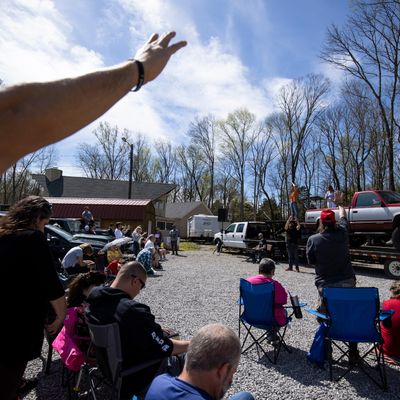
It’s no secret that one of the flash points in the administration of measures to prevent the spread of the coronavirus has been the status of religious services. Most places of worship have managed to adjust via virtual services and other events, with some even innovating with drive-in-style, socially distanced services for people who stay safely in their cars. Others are expressing their ministry by charitable acts such as food distribution or care for the homeless or the elderly.
But there’s a bit of an ideological edge in the attitude of some religious communities toward restrictions on their traditional forms of worship, which may involve crowded sanctuaries, touching and hugging, and other forms of contact generally considered highly dangerous during this pandemic. And among some conservative Evangelical Christians, the belief that traditional worship forms are literally sacred has overlapped with hostility to secular authorities, particularly those not aligned with them on political and cultural issues. There is, in fact, a strong religious flavor to the never-suppressed and now rapidly growing movement of resistance toward coronavirus lockdowns, and agitation for “reopening” businesses and other shuttered or restricted enterprises. In various parts of the country, Evangelicals are demanding the right to worship as they choose as a matter of constitutional “religious liberty,” and some conservative politicians (e.g., Florida governor Ron DeSantis) are agreeing with them to one extent or another.
How widespread is conservative Evangelical defiance of voluntary guidelines or mandatory orders that frown upon in-person worship services? Well, a late-March survey by three researchers publishing their findings at the Religious News Services found some pretty significant civil disobedience. They divided the states into three categories — 30 states with no “stay-at-home” orders or with religious exemptions; ten with stay-at-home orders that only partially restrict religious activities; and ten more with stay-at-home orders with no religious exemption. Non-Evangelical Christian congregations matched or exceeded their Evangelical counterparts in holding in-person services in states with no or limited restrictions, but among Evangelicals the same percentage (about 12 percent) of congregations reported holding such services regardless of the legal regime.
But a lot of individual believers are attending in-person services outside their customary congregations, whenever they are available, and the numbers are substantial among Evangelicals:
Just because 88% of congregations are following public health officials’ advice does not mean that individuals are following suit. Our survey asked if the survey respondent was still worshipping in person even if their own congregation was closed, presumably crowding into a church that is open. This number was much higher — 20% of church attenders reported still attending in-person services. Did it vary by state regulations?
This number varied according to state regulations, but again, evangelicals were more likely to report worshipping in person in states with no restrictions as well as states with religious restrictions. In both cases, almost a third of church-attending evangelicals reported attending worship in person….Evangelicals’ behavior stands in contrast with non-evangelicals, among whom only about 10% report worshipping in person and without much variation across levels of state restrictions.
So Evangelicals are about three times as likely to defy restrictions on their worship as non-Evangelicals. And the researchers think Evangelical traditions and leadership have a lot to do with that defiance:
Evangelicals have been preparing for this moment. In a 1998 book, sociologist Christian Smith famously referred to evangelicals as “embattled and thriving,” and we can see that embattled mentality on display here. But this view is also currently being stoked by religious elites, with a number of evangelical leaders calling for active resistance against state orders. Christian right legal groups such as Liberty Counsel are spoiling for fights; other Christian right think tanks are urging resistance, supporting the few individual clergy who are quite open about their mission.
The Rev. Tony Spell, the Louisiana pastor who has been charged with a misdemeanor for keeping his church open, told Reuters: “The church is the last force resisting the Antichrist. Let us assemble regardless of what anyone says.”
Lord have mercy.






























